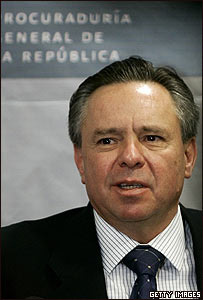
|  |  |  Editorials | Issues | December 2008 Editorials | Issues | December 2008  
Mexico’s Crime Fight Key to Fueling Recovery
 Andres R. Martinez - Bloomberg Andres R. Martinez - Bloomberg
go to original


| | More than 5,100 drug-related killings this year, double from a year earlier, signals that crime groups are intensifying combat over a shrinking drug market and weakening, Medina Mora said. |  |
Mexico’s success in battling heavily armed crime syndicates will define the pace and strength of the country’s recovery from the global economic crisis, the finance ministry’s chief economist said.

Unless Mexico gets its organized crime violence under control, the country will continue to lose 1 percentage point from its annual growth rate, said the ministry’s Miguel Messmacher. Should the offensive against crime succeed, Mexico will attract new foreign investors and be better positioned than competitors to benefit from any U.S. stimulus spending.

“Once we have a turnaround in the global economic cycle, we should actually end up with higher levels of foreign direct investment,” Messmacher said in an interview yesterday in Washington, where he and Mexico’s attorney general and foreign minister met with U.S. counterparts on crime-fighting strategy.

Mexico is betting its beefed-up efforts to combat organized crime with U.S. assistance will yield its first results about the same time the worst financial crisis since the Great Depression comes to an end, said Attorney General Eduardo Medina Mora. More than 5,100 drug-related killings this year, double from a year earlier, signals that crime groups are intensifying combat over a shrinking drug market and weakening, Medina Mora said.

The government has confiscated more than 29,000 weapons this year, about 16,000 of them assault rifles brought in from the U.S., arms more powerful than anything the police carry, Medina Mora said.

Not Peaked

“We have not reached a peak yet,” Medina Mora said.

Investment by foreign companies in Mexico may fall 22 percent to $18 billion this year from $23.2 billion last year, the government said this month.

While most of the decline stems from the financial crisis, an organized crime spree of mass killings and beheadings across the country has taken a toll on investment in the 10.5-trillion peso ($783.9 billion) economy, Messmacher said.

The Economy Ministry forecast growth of 1.5 to 1.8 percent next year, while a central bank survey of analysts reported a median estimate of 0.38 percent. Citigroup Inc. revised its forecast to say Mexico’s economy will shrink 0.2 percent next year.

Obama’s Stimulus

Messmacher said the government is waiting to see the size of President-elect Barack Obama’s stimulus plan before making new estimates for next year’s growth. A “substantial” plan could put Mexico, which sells 80 percent of its exports to the U.S., ahead of its emerging market competitors in recovering from a slowdown, he said. Success in the crime war would allow Mexico to bounce back faster and more robustly, Messmacher said.

So far, the U.S. has released $197 million of the $1.4 billion it pledged as part of the Merida Initiative to help fight drug trafficking violence in Mexico and Central America. The aid has come in the form of new equipment, drug-sniffing dogs and helping set up programs to root out corruption. The U.S. Defense Department will provide helicopters and other aircraft as part of the initiative.

“It is more significant because of what it represents politically: the concept of assumed responsibility,” said Foreign Minister Patricia Espinosa during the interview in Washington.

Mexican cartels make more than $14.8 billion a year from selling marijuana, cocaine, heroine and amphetamines to U.S. drug users, according to White House figures. The country supplies about 90 percent of the cocaine used in the U.S.

The next meeting to discuss the Merida Initiative may take place in Mexico next year, according to a joint statement issued by the U.S. State Department yesterday.

To contact the reporter on this story: Andres R. Martinez in Mexico City at amartinez28(at)bloomberg.net |

 |
|  |



